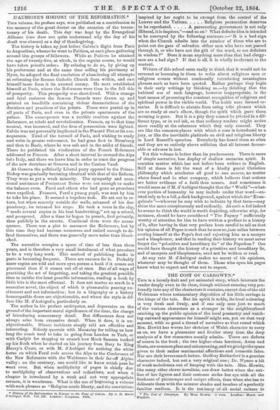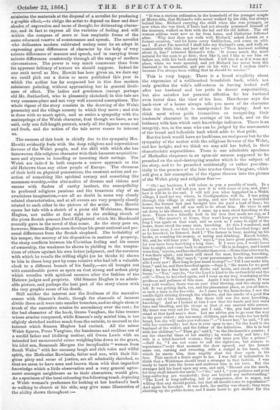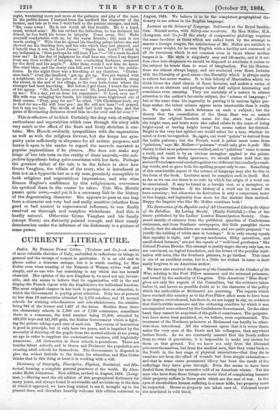THE COST OF CAERGWYN.* Tars is a loosely-knit and yet
animated story, which interests the reader deeply even to its close, though without entering very pro- foundly into any of the characters it contains, except that of the old Welshman whose testamentary disposition of his little savings is the hinge of the tale. But its spirit is noble, its local colouring is very fresh and lively, and if one only sees just so much of the various characters as a stranger in the neighbourhood catching up the public opiuion of the local peasantry and watch- ing outward appearances for himself might see, yet on that very account, with so good a thread of narrative as that round which Mrs. Howitt has woven her sketches of Welsh character to carry us on, we have a pleasanter and livelier story than the deep analysis of a few characters usually admits. There are defects of course in the book ; the two higher-class heroines, Anna and Neste, are common-place and uninteresting, and we grudge the space given to their rather sentimental affections and romantic fates. Nor are their lovers much better. Godfrey Rutherford is a genuine character indeed, but not a very original one ; Dr. Wynne a bit of weak melodrama out of keeping with the tale. Mrs. Hewitt, like many other clever novelists, can draw better when the out- line of her figures and their costume strike her eye with all the freshness of picturesque and unique effects, than when she has to delineate them with the minuter shades and touches of a perfectly familiar medium. It is the teniency of all social culture to
* The Cost of Caerrelin. By Bury &mat. 3 Yo:s. Landon: Hurst and Blaekett. The success of this book is chiefly due to the sympathy Mrs. Howitt evidently feels with the deep religious and superstitious fervour of the Welsh people, and the skill with which she has interwoven this religious character with their immense acquisitive- ness and slyness in hoarding or investing their savings. The Welsh are indeed in both respects a nearer approach to the old Hebrews than any other people of Europe. The closeness of their hold on physical possessions, the constant action and re- action of something like spiritual ecstacy and something like mammon-worship,—the alternation of dreams and visions and omens with flashes of earthy instinct, the susceptibility to profound religious passions and the tenacious clay of an avaricious imagination,—are all no doubt in some way closely related characteristics, and at all events are very properly closely related to each other in the picture of the artist. Mrs. Howitt opens her tale with a sketch of a pious old Welshman, Simeon Hughes, not unlike at first sight to the striking sketch of the pious Scotch peasant David Elginbrod which Mr. Macdonald recently gave in the novel of that name. As the story goes on, however, Simeon Hughes soon develops his great national and per- sonal differences from the Scotch shepherd. The irritability of his temper, the secrecy of his disposition in matters of property, the sharp conflicts between his Christian feeling and his senses of ownership, the weakness he shows in yielding to the tempta- tions of others against his own better judgment, and the soreness with which he recalls the trifling slight (as he thinks it) shown to him in times long past by some relative who had left a valuable clock to a different branch of his family,—are all brought out with considerable power as spots on that strong and ardent piety which wrestles with spiritual enemies after the fashion of the Hebrew judges and prophets. Old Simeon Hughes is an admir- able picture, and perhaps the best part of the story closes with the very graphic scene of his death.
Still neither the interest nor the liveliness of the narrative ceases with Simeon'e death, though the channels of interest divide there as it were into smaller branches, and no single stem or trunk of the narrative retains its ascendancy over the rest ; for the bad character of the book, Grono Vaughan, the false trustee whose avarice conquered, while Simeon's only misled him, is too slightly sketched andtoo much from the outside, to succeed to the interest which Simeon Hughes had excited. All the minor Welsh figures, Frees Vaughan, the handsome and reckless son of a sordid father and idolizing mother, old Owen Lewis with an intended but unsuccessful crime weighing him down to the grave, his idiot son, Susannah Morgan the inexplicable "woman from South Wales" with her uncanny laugh and rich voice and wilful spirit, the Methodist Rowlands, father and son, with their liti- gious piety and sense of justice, are all admirably sketched, so that we seem to have seen and known them with that imperfect knowledge which a little observation and a very general agree- ment amongst neighbours as to their characters, would give. As a specimen of the local colouring the following touch, depicting a Welsh woman's preference for looking at her husband's back to walking to church at his side, may give some illustration of the ability shown throughout :— minimize the materials at the disposal of a novelist for producing a graphic effect,—to oblige the artist to depend on finer and finer shades of expression and turns of thought.for delineating charac- ter, and in fact to express all the varieties of feeling and will within the compass of more or less emphatic forms of the same educated reserve of countenance and speech. The novelist who delineates modern cultivated society must be an adept in expressing great differences of character by the help of very minute differences of manner and speech, and in carrying those minute differences consistently through all the range of modern circumstance. The power is very much commoner than from its apparent delicacy of texture we should suppose. Indeed for one such novel as Mrs. Howitt has here given us, we dare say we could pick out a dozen or more published this year in which the author has far surpassed her in this fine modern miniature painting, without approaching her in general liveli- ness of effect. The ladies and gentlemen (except perhaps old Mr. Rutherford, who is pleasantly sketched) in this tale are very common-place and not very well executed conceptions. The whole vigour of the story consists in the drawing of the Welsh peasantry and the village scenery in which they move ; and this is done with so much spirit, and so entire a sympathy with the mainsprings of the Welsh character, that though we have, as we said, only orie full-length portrait, nearly all the figures seem real and fresh, and the action of the tale never ceases to interest us.
"'Oh! my brethren, I will relate to you a parable of truth. In a familiar parable I will tell you how it is with souie of you, and, alas ! how it will be in the end. I will tell you what happened in a Welsh village, I need not say where, in Cardiganshire will do. I was going through this village in early spring, and saw before mo a beautiful house, the farmer had just brought into his yard a load of limo ; his horses were fat, and all was well to do about him. Ho went in and sat down to his dinner, and as I came up a matt stood knocking at the door. There was a friendly look in his face that made me say, as I passed, "The master's at home, they won't keep you waiting." Before long I was again on that road, and as soon as I came in sight of the house, there stood the same man, knocking. At this I wondered, and as I came near, I saw that he stood as one who had knocked long ; and as he knocked, he listened. Said I, "The farmer is busy, making up his books, or counting his money, or eating and drinking. Knock louder, Sir, and he will hear you! But," says I, "you have great patience, Sir, for you have boon knocking a long time. If I were you, I would leave him to-night, and come back to-morrow."—" Ho is in danger, and I must warn him," says he, and knocked louder than oven—Some time afterwards, I was there again ; and there still stood the man, knocking, knocking, knocking ! "Well, Sir," says I, "your perseverance is the most remark- able I over saw ! How long do you moan to stop?"—" Till loan make him hear," said he, and then knocked again.—Says I, "He wants for no good thing ; he has a flue farm, and flocks and herds, and stack-yards and barns."—"Yes," says ho, "for the Lord is kind to the unthankful and the ovil."—Then he knocked again, and I went on my way, wondering at the goodness and patience of this man. Again I was in those parts. It was very cold weather, there was an east wind blowing, and the sleety ruin fell. It was getting dark, too, and the pleasantest place, as you all know, at such a time is the fire-side. As I came by the farm-house, I saw the candle-light shining through the windows, and the smoke of a good fire coming out of the chimney. But there still was the man knocking, knocking ! And as I looked at him I saw that his hands and foot were bare and bleeding, and his visage as that of one marred with sorrow. My heart was very sad for him, and I said, "Sir, you had better not stand at that hard man's door. Lot me advise you to go over the way to the poor widow ; she has many children, and she works for her daily bread, but she will make you welcome !"—" I know her," he said, "I am with her continually; her door is ever open to me ; for the Lord is the husband of the widow, and the father of the fatherless. She is in bed with her children."—" Then go," said I, "to the blacksmith's yonder; I see the cheerful blaze of his smithy ; he works early and late ; his wife is a kind-hearted woman ; they will treat you like a prince !" —Said he, "I am not come to call the righteous, but sinners to repentance !"—At that moment the door opened, and the farmer came out, cursing and swearing, with a cudgel in his hand, with which he smote him, then angrily shut the door again in his face. This excited a fierce anger in me. I was full of indignation to think that a Welshman should treat a stranger in that fashion. I was ready to burst into the house and maltreat him in his turn. But the stranger laid his hand upon my arm, and said, "Blessed are the meek, for they shall inherit the earth."—" Sir," said I, "your patience and your long-suffering are wonderful ; they are beyond my understanding." "The Lord is long-suffering, full of compassion, slow to anger, not willing that any should perish, but that all should come to repentance!" And again he knocked. It was dark, the smithy was closed ; they wore shutting up the public-house, and I made haste to get shelter for the It was a curious ordination in the household of the younger couple at Mawn-ddu, that Richard's wife never walked by his side, but always behind him. Richard carrying the child when sho was younger, or now when she was tired, if Lint° had not already possessed himself of the treasure, walked on first with the lad and his old father. The old woman seldom went now so far from home, and Catherine followed after. ' Why dost thou not walk with Richard,' asked Laura on a former occasion, 'and let Tante carry Cadifychan, and come on with me P If over I'm married I shall take my husband's arm, and walk on comfortably with him, and hear all he says.'—` Thou knowest nothing about it, lass !' returned Richard's wife. It seems much the most natural for the men to go first ; they like it, and I like to see him on before me, with his back nicely brushed. I fell into it as if it were my place, when we were married, and yet Richard has never been the husband to be masterful, and put on his wife ; but I reckon that's. because I've always been willing that ho should be master:"
This is very happy. There is a broad simplicity about the expression of a wellbrushed broadcloth back, which not only gratifies the wife's self-esteem in having looked well after her husband and her pride in decent respectability, but also satisfies her personal affection for her husband even better than the view of his face. Hawthorne says the back-view of a house always tells you more of its character than the front, which is manipulated for display. And we think most wives pride themselves on recognising their husbands' character in the carriage of his back, and on the intimacy with him which such knowledge indicates. There is an integrity, too, iu the man who can be judged by the movements of the broad and inflexible back which adds to that pride.
But the book would have no backbone, no real power but for the sympathy of the author with the religious fervour of the Welsh, and her insight, and we think we may add her belief, in their characteristic superstitions. There is one admirable specimen of Methodist eloquence in an open-air sermon supposed to be preached on the soul-destroying avarice which is the subject of the story, and to be preached accidentally or rather providen- tially in the presence of the false trustee Grono Vaughan, which will give a fair conception of the vigour thrown into the picture of the Welsh piety and religious fear :—
nights wondering more and more at the patience and pity of the man. In the public-house I learned from the landlord the character of the farmer, and late as it was I went back to the patient stranger, and said,
come away ! He is not worth all this trouble. Ho is a hard, erne], wicked man ! He has robbed the fatherless, he has defamed his friend, he has built his house in iniquity. Come away, Sir ! Make yourself comfortable with us, by the warm fireside ; this man is not worth saving !" With that he spread his bleeding palms before me, and showed me his bleeding feet, and his side which they had pierced, and I beheld that it was the Lord Jesus ! "Smite him, Lord !" I cried in my indignation, "then perhaps he will hear Thee !"—" Of a truth he shall hear me ! In the day of judgment he shall hear me, when I say depart from me, thou worker of iniquity, into everlasting darkness, prepared for the devil and his angels !" After these words I saw him no more. The wind blew, and the sleety rain fell, and I went back to the public- house. In the night there was a knocking at my chamber. " Christ- mas-bach !" cried the landlord, "get up, get up. You are wanted with a neighbour, who is at the point of death !" Away I hurried, along the street, to the end of the village, to the very farm-house whero the stranger had been knocking. But before I got there, I heard the voice of his agony. "Oh, Lord Jesus, save me ! Oh, Lord Jesus, have mercy on me ! Yet a day, yet an hour for repentance ! 0 Lord, save me !" His wife was wringing her hands, his children were frightened out of their senses. "Pray, pray for me !" he cried. "Oh Christmas-bach, cry to God for me—He will hear you ! me He will not hear !"—I prayed, but it was too late. The devils of hell had hold upon him, and the gates of Everlasting darkness closed him in—for ever and for ever !' " This is effective of its kind. Certainly the deep vein of religious enthusiasm and superstition which runs through the story adds very much to the effect of the fresh and lively sketches it con- tains. Mrs. Howitt evidently sympathizes with the superstition as well as with the religious fervour, but she keeps her sym- pathy quite sufficiently in abeyance for all artistic purposes, and leaves it open to the reader to regard the marvels narrated as popular superstitions if he pleases. ,She does not make any hinge of her tale turn on the reality of these marvels,—the sub- jective hypothesis being quite consistent with her facts. Perhaps the greatest defect of the tale is in the failure to show how Grono Vaughan, the villain of the story, who is introduced at first not as a hypocrite but as a sly man, genuinely susceptible to both religious and superstitious impressions, and who wins Simeon Hughes's confidence by this religiousness, overcomes his spiritual fears in the course he takes. This Mrs. Howitt passes quite over,—and yet it is a necessary link in the history of the degenerating character. She appears to pass at one leap from a character not very bad and really sensitive (whether from good or bad causes) to supernatural influence, to one finally resolved on thorough and complete wickedness. And this is hardly natural. Otherwise Grono Vaughan and his family (except Neste) are distinctly painted enough, and their steady deterioration under the influence of his dishonesty is a picture of some power.
































 Previous page
Previous page